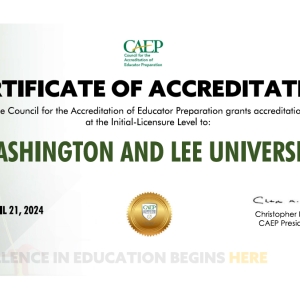
Education Studies Program

Education Studies at Washington and Lee offers minors in Education and Education Policy, as well as a nationally accredited Teacher Licensure program as a partner of the Rockbridge Teacher Education Consortium (RTEC).
RTEC is a partnership between Washington and Lee University and Southern Virginia University.
The value and advantages of the Consortium rest on several factors:
- proximity and program identity
- opportunities for a richer program through institutional collaboration
- ability to meet licensure areas where teacher shortages exist
- professional development and partnering with local schools
Collaboration among the two schools offers a number of strengths. It supplements the capacity of both education departments to create a robust program that offers more courses, more frequently. Because of the consortium, students will be better positioned to schedule and take the courses they need to complete their licensure requirements. Clearly, one of the major strengths of this collaboration is the diversity of knowledge, skills and values in the two teacher education departments that complement and reinforce each other. While each shares a common perspective as small liberal arts colleges, each also has a unique mission and attracts students with different interests and backgrounds. The consortium recognizes the complexity this generates, but values the opportunity for students to engage in a collaborative program where they can learn from each other. This collaborative structure produces a critical mass of diverse students for each education course that enriches class discussions and collaborative projects.













